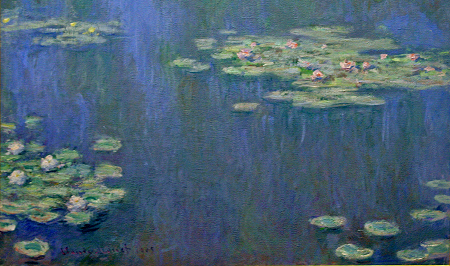Spadina Literary Review — edition 27 page 03
fiction

claude monet, water lilies
A Bad Day
by Guy Wilkinson
When the distraught mother had been finally ushered from the room, Dr. Ohlund covered the deceased — a ritual that emphasized the tragedy of the tale. Patient: male, Caucasian, five years old. Cause of death: acute internal hemorrhage, head trauma, organ failure, resulting from a motor vehicle collision — the doctor refused to use the word accident. Riding his bicycle, helmetless, the boy had been struck by an SUV. The driver had fled the scene. Human weakness, Dr. Ohlund acknowledged it.
Like all the grieving parents of Dr. Ohlund’s experience, the mother had been inconsolable. It was his manner on such occasions to speak only when spoken to. What was required was not words but touch — support, human contact. Ohlund looked at his hands. They had not resuscitated the boy, nor had they consoled the mother. He didn’t blame her for her bitterness — in her agony, she had instinctually, reflexively, lashed out. He did not tell her his own grandson was five, a boy with such energy and passion for life it was unthinkable such things could be taken away from him.
He looked up as the nurse who had led the boy’s mother away returned to the room. She must have been a recent hire, Ohlund hadn’t seen her before. For some reason, this made it easier to initiate a conversation.
“Has someone come for her?” he asked.
The nurse shook her head, looking down at the motionless form under the sheet. She was young, reed-like, surprisingly pale. “I put her in a taxi,” she said. “She said...I’d know how she felt, when I lost a child of my own.”
“There are only victims here,” he sighed. “I’m certain of that. Only human error, human frailty.”
His obvious weariness ended the conversation. They both had other matters to attend to.
As Dr. Ohlund backed his Volvo out of the reserved parking stall, he was trying to shake death, trying to leave death behind him. He emerged from the underground parkade into heavy rain, a sky dark with clouds. It was six o’clock in the evening but could as easily have been midnight. He would have liked to close his eyes, simply to sleep, but a call from his wife Nora had undermined such intentions. She’d reminded him of dinner plans with their daughter and wanted him to pick up a bottle of wine. She had not inquired as to his day.
His daughter Clare lived in the suburbs, so over and above the downpour there was suburban rush-hour traffic to negotiate. Road conditions demanded a physical and mental alertness Ohlund had to struggle for. He clutched the wheel too tightly and craned his neck. He was objective enough to recognize this discomfort was exacerbated by a not-wholly-repressed reluctance to fulfill this dinner obligation. Of course he was always pleased to see Clare, she was their only child, and even more so he valued the time spent with his grandson. But his relationship with Clare’s husband Robert had never been easy, even now after seven years. Robert, a millworker at a foundry, was a burly man of sour disposition. A drinking man. It was regrettably obvious to Dr. Ohlund that his daughter and grandson were not cherished in the manner they deserved. Ohlund thought again of the boy lying motionless on the hospital bed. He wondered, in spite of himself, what effect such a sight would have on his son-in-law. Human error, he thought. Human frailty.
A blast from the horn of a pickup truck behind him startled the doctor out of his reverie. He’d been waiting at a red light and hadn’t realized it had changed. He stepped on the accelerator, making a gloved wave of apology at the rear-view mirror. Pay attention, he scolded himself. Ahead, to his right, he saw the strip mall with the wine shop and remembered his obligation. He would need to cross two lanes to make the entrance. He checked his rear-view mirror and then veered into the centre lane.
There was a sudden screech of tires behind him, followed by two horn blasts, the second one sustained. The pickup truck, the same one he’d just delayed at the traffic lights, had been in his blind spot. Instinctively, Dr. Ohlund pressed on the accelerator. The Volvo shot forward, sliding slightly on the rain-wet surface. He looked again in the mirror. The truck was immediately on his tail, and for one fearful moment Ohlund thought he was about to be rammed. He kept to the speed limit, but his heart was racing.